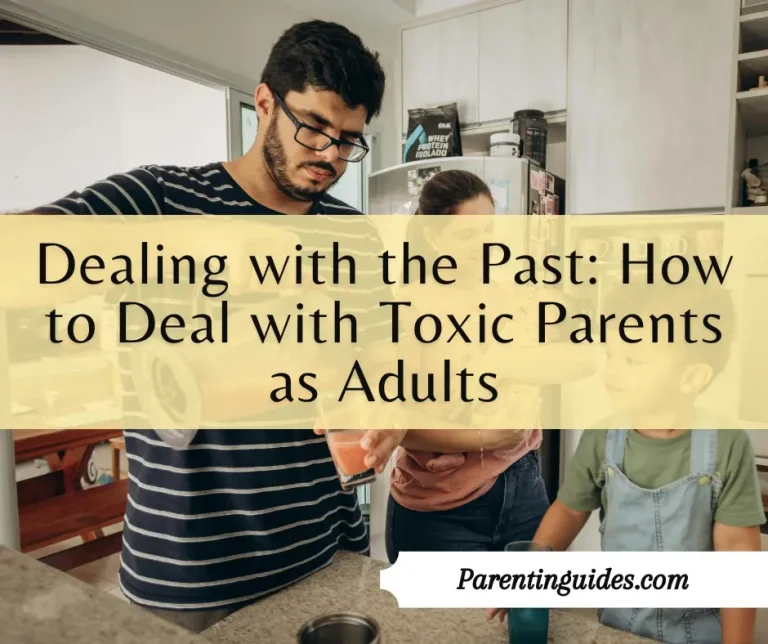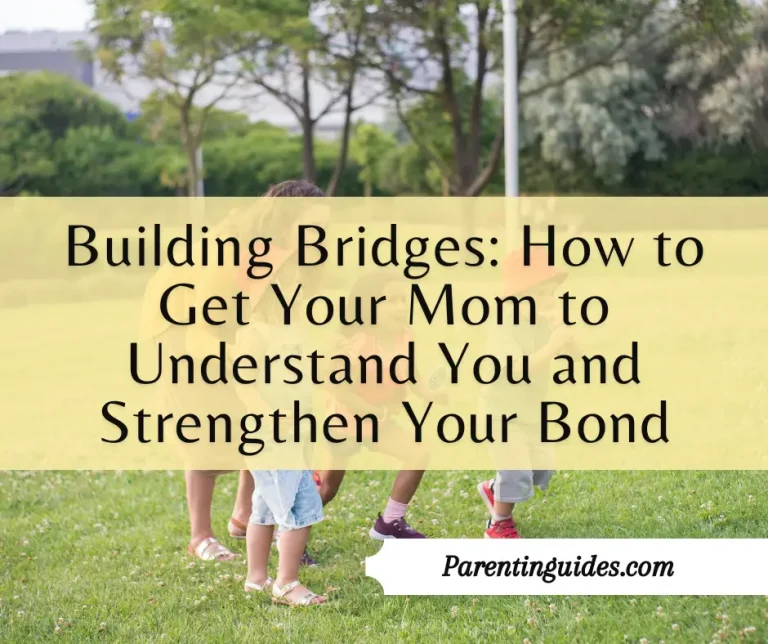Navigating the complexities of a relationship with a toxic father is challenging, especially when the well-being of children is involved. My experience as a counselor has shown me the profound impact that toxic parental behaviors can have on families. As we embark on this guide, I aim to share the essential steps to protect yourself and your children through setting appropriate boundaries.
Recognizing is essential to deal with a toxic father for your emotional health and that of your children. Throughout my years of counseling, I’ve seen many individuals struggle with feelings of guilt, frustration, and helplessness. In this article, I’ll draw on these experiences to offer practical and empathetic advice.
As parents, your primary concern is the safety and well-being of your children. By learning to deal with a toxic father effectively, you can foster a more positive family environment and model healthy relationships for your children. Let’s explore how to identify toxic behaviors, set firm boundaries, and maintain them for your family’s peace and resilience.

Understanding Toxicity in Relationships
Characteristics of a Toxic Father
If you are about to deal with a toxic father, it can be a challenging experience. In my years of counseling, I’ve seen many individuals struggle with this issue. A toxic father often exhibits behaviors such as manipulation, severe criticism, and a lack of empathy. These traits can make any relationship difficult, especially between a parent and child.
For example, one client, Emily, shared how her father would constantly manipulate her into doing things she didn’t want to do. He would use guilt and shame to control her actions, leaving her feeling powerless. This is a common tactic toxic fathers use to maintain control.
Criticism is another hallmark of a toxic father. Another client, John, recounted how his father would criticize everything he did, no matter how small. This constant negativity eroded John’s self-esteem over time. It’s crucial to recognize these patterns when you deal with a toxic father.
Empathy, or the lack thereof, is also a significant characteristic. Toxic fathers often lack the ability to understand or care about their children’s feelings. This was evident in the case of Sarah, whose father never acknowledged her emotions, leaving her feeling isolated and unloved.
The Impact on Family Dynamics
The impact of a toxic father extends beyond the individual, affecting the entire family. In my practice, I’ve seen how a toxic father can create an environment of fear and tension. This toxic atmosphere affects everyone’s mental health and well-being.
For instance, Tom’s family lived in constant fear of his father’s unpredictable anger. The children were always anxious, never knowing what might set him off. This kind of stress can lead to long-term psychological issues, including anxiety and depression. Dealing with a toxic father is not just about managing individual relationships; it involves understanding the broader impact on family dynamics.
A toxic father’s behavior can also strain the relationship between spouses. In one case, Linda and her husband struggled to maintain a united front in dealing with her toxic father. The constant stress and arguments about how to handle the situation took a toll on their marriage. It’s essential to recognize that dealing with a toxic father requires addressing these broader family dynamics to protect everyone’s mental health.
Children are particularly vulnerable to the effects of a toxic father. They may internalize the negativity and blame themselves for their father’s behavior. In my sessions, I’ve seen children like Emma, who believed her father’s anger was her fault. Helping children understand that they are not to blame is a critical step in dealing with a toxic father.
Recognizing Emotional Abuse to Deal with a Toxic Father
Recognizing emotional abuse is crucial if you are about to deal with a toxic father. Emotional abuse can be subtle, making it harder to identify. It includes behaviors such as constant criticism, belittling, and controlling actions that undermine a person’s self-worth.
In my practice, I’ve worked with clients like Lisa, who initially didn’t recognize her father’s behavior as abusive. Lisa’s father would belittle her achievements, making her feel inadequate. This kind of emotional manipulation is damaging and can have long-lasting effects on self-esteem.
Emotional abuse also involves isolating the victim from support systems. Mark’s father, for instance, would isolate him from friends and family, making him feel alone and dependent on his father. This control tactic is common among toxic fathers and can be very damaging.
By sharing experiences and providing practical advice, we can help others navigate these challenging relationships and create a healthier environment for themselves and their children.

The Importance of Setting Boundaries to Deal with a Toxic Father
What Are Boundaries?
Setting boundaries is crucial when you deal with a toxic father. Boundaries are limits we set to protect our mental and emotional well-being. They define what behavior we will and will not accept from others. In healthy relationships, boundaries help maintain respect and understanding.
In my counseling practice, I often explain boundaries to clients by comparing them to fences around a property. Just as a fence keeps out intruders, boundaries keep out harmful behavior. For example, Maria, a client of mine, learned to set boundaries with her father by clearly stating that she would not tolerate his constant criticism. This helped her feel more secure and respected in their interactions.
Boundaries are not about punishment but about self-respect and safety. They help you protect your emotional space and maintain your sanity. When you deal with a toxic father, establishing these limits is essential for your well-being and that of your children. Remember, setting boundaries is a healthy and necessary step in any relationship, especially when dealing with toxicity.
How to Set Boundaries
Setting boundaries with a toxic father can be challenging, but it’s vital. The first step is to identify the behaviors that are unacceptable. Once you’ve identified these behaviors, you can start to set clear and specific boundaries.
One of my clients, Tom, found it helpful to write down his boundaries before discussing them with his father. This gave him clarity and confidence. For instance, Tom decided that he would no longer tolerate his father shouting at him in front of his children. He communicated this boundary calmly and clearly, saying, “Dad, if you raise your voice at me, I will leave the room.”
Communication is key when setting boundaries. Use “I” statements to express how you feel and what you need. This approach reduces defensiveness and keeps the focus on your feelings. For example, “I feel disrespected when you criticize me in front of my kids. I need you to speak to me privately if you have concerns.”
It’s important to be firm and consistent. If your father crosses a boundary, enforce the consequence you’ve set. It may be difficult at first, but consistency helps reinforce the importance of these boundaries. Knowing how to deal with a toxic father involves setting and enforcing these boundaries.
Maintaining Boundaries
Maintaining boundaries is often the most challenging part, especially with a toxic father who may not respect them. It’s crucial to stay firm and consistent in enforcing your boundaries, even when it’s difficult.
One of my clients, Sarah, found that her father would constantly test her boundaries. Initially, it was exhausting for her to keep enforcing them. However, she realized that every time she upheld her boundaries, she felt stronger and more in control. She reminded herself that maintaining boundaries is not a one-time event but an ongoing process. This consistency is key when you deal with a toxic father.
Support systems can be incredibly helpful in maintaining boundaries. Surround yourself with friends or family members who understand your situation and can provide encouragement. Sarah often leaned on her sister for support, which made it easier for her to stay firm.
Self-care is also vital. How to deal with a toxic father involves taking care of your own needs. Dealing with a toxic father can be draining, so it’s essential to take time for yourself. Engage in activities that rejuvenate you and help you stay grounded. Whether it’s reading, exercising, or simply taking a walk, these activities can help you maintain the strength to enforce your boundaries.
Remember, the goal is to protect your emotional well-being and create a safer, healthier environment for you and your children. Setting and maintaining boundaries is a powerful way to achieve this when you deal with a toxic father.

Communication Strategies to Deal with a Toxic Father
Effective Communication Techniques
Effective communication is essential when you deal with a toxic father. One of the most important techniques is using “I” statements. This method focuses on expressing your feelings without blaming the other person. For example, instead of saying, “You never listen to me,” you could say, “I feel unheard when you interrupt me.”
In my counseling sessions, I’ve seen how powerful “I” statements can be. They help to de-escalate situations and keep the conversation respectful. This approach was particularly effective for my client, Laura. She found that using “I” statements helped her communicate her needs without provoking her father’s defensiveness.
Another key technique is to avoid confrontation. Toxic fathers often thrive on conflict, so it’s best to keep the conversation calm and focused on solutions. For instance, if your father starts to raise his voice, you can calmly say, “I will not continue this conversation if we cannot speak respectfully.”
It’s also helpful to prepare for these conversations. Think about what you want to say and anticipate possible reactions. Practicing with a friend or therapist can also be beneficial. Remember, the goal is to communicate effectively, not to win an argument. This strategy is crucial when learning how to deal with a toxic father.
What to Avoid in Conversations
When you deal with a toxic father, there are certain pitfalls to avoid in conversations. One major pitfall is escalation. If the conversation becomes heated, it’s important to stay calm. Raising your voice or becoming defensive can make the situation worse.
In my practice, I’ve seen many clients struggle with this. For example, Michael often found himself shouting back at his father during arguments, which only escalated the conflict. By learning to stay calm and composed, he was able to prevent conversations from spiraling out of control.
Another common pitfall is giving in to provocations. Toxic fathers may use hurtful comments or manipulation to provoke a reaction. It’s important to recognize these tactics and not let them derail the conversation. If your father says something hurtful, take a deep breath and respond calmly.
It’s also crucial to avoid long, drawn-out discussions. Toxic individuals often try to wear you down by prolonging arguments. Set a time limit for your conversations and stick to it. For instance, you can say, “I can talk about this for 15 minutes, but then I need to go.” This helps you maintain control over the interaction and protects your emotional well-being.
Seeking Mediation
Sometimes, despite your best efforts, you may find that direct communication with your father is not effective. In these cases, seeking mediation can be a valuable step in learning how to deal with a toxic father. A professional mediator or therapist can facilitate these conversations and provide a neutral perspective.
In my experience, mediation has helped many clients. For example, Jessica’s relationship with her father improved significantly after involving a mediator. The mediator helped them set ground rules for communication and ensured that both parties were heard.
When to seek mediation? If you find that conversations with your father are consistently unproductive or harmful, it might be time to involve a professional. A mediator can help you navigate these difficult interactions and find common ground. Therapists can also provide valuable support. They can help you develop communication strategies, set boundaries, and work through the emotional challenges of dealing with a toxic father.
Here, communication strategies are vital when you deal with a toxic father. By using effective techniques, avoiding common pitfalls, and seeking mediation when necessary, you can improve your interactions and protect your emotional health. Remember, learning how to deal with a toxic father is a process, and it’s okay to seek support along the way.

Self-Care and Support to Deal with a Toxic Father
Importance of Self-Care
When you deal with a toxic father, self-care becomes essential. Taking care of yourself both emotionally and physically is crucial. It’s like putting on your own oxygen mask first before helping others.
I’ve seen clients like Rachel, who neglected their own needs while trying to manage their toxic fathers. Over time, Rachel learned that self-care wasn’t selfish. It was necessary. She started small, by taking daily walks and setting aside time for her hobbies. These activities helped her feel more grounded and less overwhelmed.
Emotional self-care involves acknowledging your feelings and giving yourself permission to feel them. If you’re feeling sad, angry, or frustrated, allow yourself to experience these emotions without judgment. Physical self-care includes activities like regular exercise, a balanced diet, and adequate sleep. These basic habits can significantly improve your resilience and overall well-being.
Remember, you can’t pour from an empty cup. Taking care of yourself equips you to better deal with a toxic father and protect your mental health. Self-care is not just about pampering yourself; it’s about maintaining your health and sanity.
Building a Support System
Building a strong support system is vital when you deal with a toxic father. Surround yourself with people who understand your situation and can offer emotional support. This network can include friends, family, or support groups.
In my counseling practice, I’ve encouraged clients like Mike to reach out to trusted friends and family members. Mike found comfort in sharing his experiences with his close friend, who provided a listening ear and valuable advice. Having someone who understands your struggles can make a huge difference.
Support groups can also be incredibly beneficial if you are a person who has to deal with a toxic father. These groups offer a safe space to share your experiences and hear from others who are going through similar situations. Many clients have found solace in knowing they are not alone. For instance, joining a local support group for those dealing with toxic family members can provide emotional validation and practical tips.
Therapy and Counseling
Seeking therapy or counseling is a powerful step when learning how to deal with a toxic father. Professional help can provide you with the tools and strategies to manage the emotional toll effectively. Therapy offers a safe space to explore your feelings and develop coping mechanisms.
Many of my clients, like Jenny, have benefited greatly from therapy. Jenny was overwhelmed by the constant negativity from her father. Through therapy, she learned to set boundaries and protect her mental health. Her therapist provided her with techniques to handle confrontations and reinforced the importance of self-care.
Therapists can help you understand the dynamics of your relationship with your father and guide you in setting healthy boundaries. They can also offer strategies to manage stress and anxiety. Therapy is not just for times of crisis but can be a long-term resource for maintaining emotional well-being.
If therapy is not an option, consider speaking with a counselor or life coach. These professionals can offer guidance and support tailored to your situation. Remember, seeking help is a sign of strength, not weakness. It shows that you are taking proactive steps to improve your mental health and overall quality of life.
So, self-care and support are crucial when you deal with a toxic father. Learning how to deal with a toxic father involves not just managing the relationship but also taking care of yourself. Your mental and emotional health are worth the effort.

Legal and Practical Considerations
Understanding Legal Rights
When you deal with a toxic father, understanding your legal rights is crucial. Legal protections, such as restraining orders, can provide safety and peace of mind. Family law advice can also be invaluable. I had a client, Jane, who sought a restraining order against her father after repeated harassment. This step was crucial for her safety and well-being.
Knowing your rights empowers you to take action if necessary. Consult with a family law attorney to understand the options available to you. This professional can guide you through the process and ensure that your legal rights are protected. It’s important to be informed and prepared to protect yourself and your children.
Financial Independence
Achieving financial independence is vital when you deal with a toxic father. Financial control can be a form of manipulation used by toxic individuals. One of my clients, Lisa, struggled with financial dependence on her father, which made it difficult for her to set boundaries.
To achieve financial independence, start by creating a budget and setting financial goals. Open a separate bank account if necessary. Seek advice from a financial planner to help manage your finances. Building financial independence provides you with the freedom to make decisions that are best for you and your family without undue influence from a toxic father.
Preparing for Escalation
When you set boundaries to deal with a toxic father, be prepared for potential escalations. A toxic father may react negatively to the enforcement of these boundaries. One client, Mike, experienced increased hostility from his father after setting firm boundaries. This is a common reaction and it’s important to be prepared.
Develop a safety plan in case the situation escalates. This might include having a safe place to go or a trusted person to call. Keep important documents and emergency contacts accessible. It’s also wise to document interactions with your father, especially if they are hostile. This documentation can be useful if legal action becomes necessary. By sharing my clients’ experiences, I hope to provide you with the tools and knowledge needed to navigate these challenging relationships effectively to deal with a toxic father.

Conclusion
Dealing with a toxic father is a challenging journey, but setting boundaries and prioritizing self-care are crucial steps. By understanding toxic behaviors, you can better protect your emotional well-being. My clients have found that these strategies lead to healthier relationships and improved mental health.
Remember, you are not alone. Many people struggle with these issues, and there are resources available to help. Whether it’s seeking professional therapy, building a strong support system, or understanding your legal rights, there are ways to manage and overcome these challenges.
Empower yourself to take action. Knowing how to deal with a toxic father can make a significant difference in your life and the lives of your children. Take the first step today and seek the support you need. Your well-being and that of your family are worth the effort.





